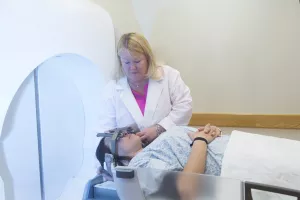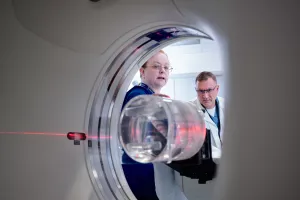Radiation oncology is a medical specialty that uses high-energy radiation to treat cancer and other conditions. Radiation oncology is an essential part of cancer care along with surgery and medications.
How does radiation treatment work?
Radiation oncology, or radiation therapy, is a safe, effective and important part of many treatment paths for people living with cancer.
Radiation treatments are delivered to your body with laser-like precision. These highly energized ions help successfully shrink cancer cells while protecting your healthy tissue. About half of people living with cancer will receive radiation treatment.
If you have questions about your treatment, want to find a support group or just need to talk, know that your care team will be there for you every step of the way.

Conditions
Radiation oncology is a common treatment option for the following types of cancer and is also showing promising results for some benign diseases.
Treatments
Your radiation oncologist will work with your primary care doctor and other specialists to create a wellness plan that's uniquely yours. It's important to remember that radiation oncology treatment can vary based on individual needs and the stage of the cancer.
If radiation therapy is the right treatment choice for your condition, we'll help you schedule a special kind of planning appointment called a simulation. During a simulation, we'll:
- Determine the position your body will be in for your treatments
- Perform a CT scan to examine the treatment area
- Place markings on your skin to pinpoint where the treatments will be delivered
Additional diagnostic studies such as MRI or PET scans may help us determine the treatment area.
Types of radiation therapy
Once we've pinpointed your treatment area, we'll examine your care needs to decide the type of radiation therapy you'll receive, such as:
- Gamma Knife surgery uses focused radiation to target and treat brain tumors, blood vessel issues, and other irregularities in the brain. It's a minimally invasive, highly accurate way to treat brain conditions without making incisions. We’re proud to be among the few health systems in Massachusetts and Northern New England to offer Gamma Knife surgery.
- High-dose-rate brachytherapy
- Image-guided radiotherapy (IGRT)
- Intensity-modulated radiation therapy (IMRT)
- Superficial radiotherapy
- Stereotactic body radiotherapy (SBRT)
- Stereotactic radiosurgery (SRS)
- 3D conformal radiation therapy (3DCRT)
- Volumetric arc therapy (VMAT)

From regular office visits to inpatient stays, find the healthcare you need and deserve close to home.

Meet the doctors and care team devoted to supporting you every step of the way along your path to better health.